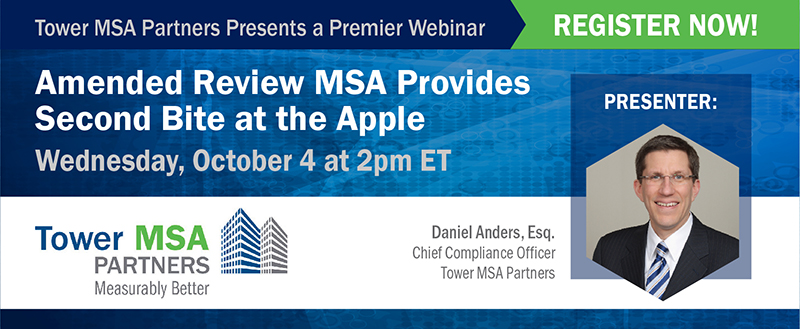The Centers for Medicare and Medicaid Services (CMS) recently updated its Workers Compensation Medicare Set-Aside (WCMSA) Reference Guide and WCMSA Self Administration Toolkit. These updates guide MSA administration when the beneficiary is enrolled in a Part C Medicare Advantage Plan or a Part D Prescription Drug Plan.
WCMSA Reference Guide Update
In its Version 4.1 of the WCMSA Reference Guide, CMS added an “Other Health Coverage,” section. Section 4.1.3 says:
… a WCMSA is still recommended when you have coverage through other private health insurance, the Veterans Administration, Medicare Advantage (Part C) or Medicare Prescription Drug Program (Part D)
CMS added the following as an explanation:
Other coverage could be canceled or you could elect not to use such a plan.
This makes sense for private health insurance, which a person may drop after becoming eligible for Medicare. Likewise, a veteran could treat at the VA initially and later seek treatment outside the VA.
However, CMS’s placement of Medicare Part C and D under “Other Health Coverage” is confusing. These are alternative delivery systems for Medicare benefits; a person must be Medicare-covered to use them. And there is no distinction between original Medicare and Parts C and D when it comes to the need for a WCMSA.
The guide makes clear distinctions regarding the coordination of benefits.
CMS notifies Part C and D plan sponsors that a WCMSA has been approved and instructs plan sponsors to conduct Medicare Secondary Payer (MSP) investigations. However, CMS does not relay WCMSA details to plan sponsors. Instead, CMS instructs plan sponsors to seek WCMSA coverage details from the WCMSA administrator as part of the plan sponsor’s investigation. When possible, Part C and D plan sponsors are required to avoid paying for expenses that should be covered by a WCMSA. (Emphasis added.)
It’s unclear why CMS does not provide WCMSA details to C and D plan sponsors as it does with original Medicare. Perhaps it’s a technology issue. From an MSP compliance standpoint, doing so would be beneficial to the plans and the injured worker as well as the taxpayers who pay for these plans.
A Quick Detour to Conditional Payments
After this section, CMS shifts from its WCMSA discussion to this statement on liens:
When a settlement is reached, the settlement details dictate who is responsible for ensuring Medicare (Parts A, B, C, and/or D) is repaid for any conditional payments associated with the WC illness or injury. If the settlement does not identify funds for past debt, CMS considers those debts up to the date of settlement to belong to the WC insurer.
Recovery may be sought from any party receiving inappropriate payment on behalf of the beneficiary.
This highlights the importance of including in the settlement terms which party is responsible for the resolution of Medicare conditional payments, whether from original Medicare or a Part C or D plan.
The Administrator Provides Treatment Details
Then the text returns to WCMSAs with this:
The administrator must provide details concerning treatments and medications used exclusively to treat a related illness or injury to the plan sponsor so the sponsor may avoid making primary payment in the future.
The MSA must either be self-administered by the injured worker or professionally administered by a third party, such as Ametros.
This last sentence in Section 4.1.3 is explained in more detail in the updated Self-Administration Toolkit, Version 1.6:
CMS will tell your Medicare Advantage or prescription drug plan that a WCMSA has been approved. Insurance plans are not given specific information about treatment and medications that should be covered by the WCMSA. You must tell your insurance plan sponsor any details concerning treatments and medications used exclusively to treat a related illness or injury, so they can avoid making primary payment in the future. CMS requires your plan to contact you or the administrator of your WCMSA to find out which expenses are covered by your WCMSA. The plan must avoid paying for expenses that are included in the WCMSA. The plan has a responsibility to recover any payments it made that should have been paid by the WCMSA. If you do not respond to your plan’s investigation efforts, your coverage may be delayed or cancelled.
If you are enrolled in a Medicare Advantage or prescription drug plan, please contact your plan to discuss your WCMSA, if you have not already done so.
Since CMS does not “relay WCMSA details to plan sponsors,” this appears to be how the Part C and D plans learn which diagnoses, treatments, and medications are included in the MSA.
WC Payers and CMS have made tremendous investments into Section 111 reporting and the WCMSA submission and approval processes. Therefore, it is disappointing that the MSA administrator is responsible for communicating with the Part C or D plan.
It remains unclear exactly how the MSA administrator will communicate with the Part C and D plans. Will the plan provide the administrator with a form or other instructions on how to notify the plans? How often should such communication occur?
All in all, this makes MSA self-administration even more difficult.
Tower does its best to help clients and partners navigate CMS changes. Our Chief Compliance Officer, Dan Anders, is available to answer questions and discuss how these updates affect you. Contact him at daniel.anders@towermsa.com.










